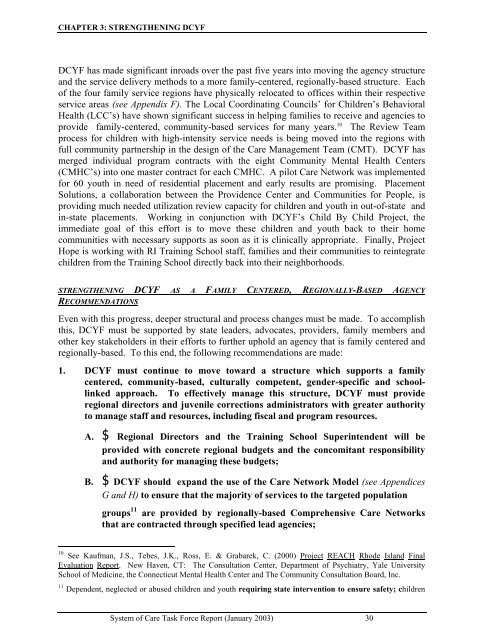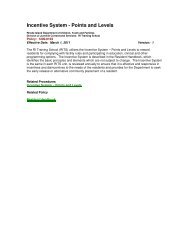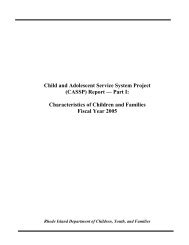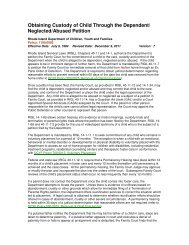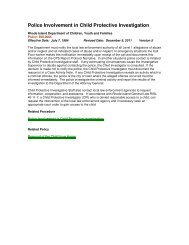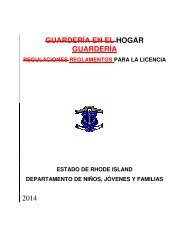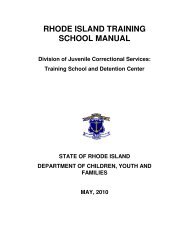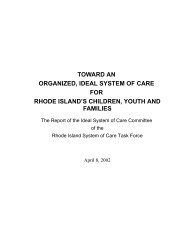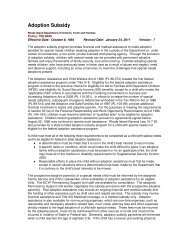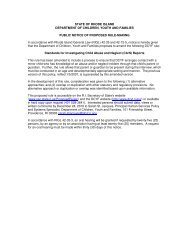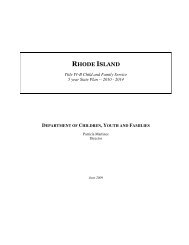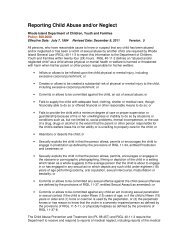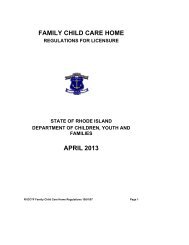Final Report - RI Department of Children, Youth & Families
Final Report - RI Department of Children, Youth & Families
Final Report - RI Department of Children, Youth & Families
You also want an ePaper? Increase the reach of your titles
YUMPU automatically turns print PDFs into web optimized ePapers that Google loves.
CHAPTER 3: STRENGTHENING DCYF<br />
DCYF has made significant inroads over the past five years into moving the agency structure<br />
and the service delivery methods to a more family-centered, regionally-based structure. Each<br />
<strong>of</strong> the four family service regions have physically relocated to <strong>of</strong>fices within their respective<br />
service areas (see Appendix F). The Local Coordinating Councils’ for <strong>Children</strong>’s Behavioral<br />
Health (LCC’s) have shown significant success in helping families to receive and agencies to<br />
provide family-centered, community-based services for many years. 10 The Review Team<br />
process for children with high-intensity service needs is being moved into the regions with<br />
full community partnership in the design <strong>of</strong> the Care Management Team (CMT). DCYF has<br />
merged individual program contracts with the eight Community Mental Health Centers<br />
(CMHC’s) into one master contract for each CMHC. A pilot Care Network was implemented<br />
for 60 youth in need <strong>of</strong> residential placement and early results are promising. Placement<br />
Solutions, a collaboration between the Providence Center and Communities for People, is<br />
providing much needed utilization review capacity for children and youth in out-<strong>of</strong>-state and<br />
in-state placements. Working in conjunction with DCYF’s Child By Child Project, the<br />
immediate goal <strong>of</strong> this effort is to move these children and youth back to their home<br />
communities with necessary supports as soon as it is clinically appropriate. <strong>Final</strong>ly, Project<br />
Hope is working with <strong>RI</strong> Training School staff, families and their communities to reintegrate<br />
children from the Training School directly back into their neighborhoods.<br />
STRENGTHENING DCYF AS A FAMILY CENTERED, REGIONALLY-BASED AGENCY<br />
RECOMMENDATIONS<br />
Even with this progress, deeper structural and process changes must be made. To accomplish<br />
this, DCYF must be supported by state leaders, advocates, providers, family members and<br />
other key stakeholders in their efforts to further uphold an agency that is family centered and<br />
regionally-based. To this end, the following recommendations are made:<br />
1. DCYF must continue to move toward a structure which supports a family<br />
centered, community-based, culturally competent, gender-specific and schoollinked<br />
approach. To effectively manage this structure, DCYF must provide<br />
regional directors and juvenile corrections administrators with greater authority<br />
to manage staff and resources, including fiscal and program resources.<br />
A. $ Regional Directors and the Training School Superintendent will be<br />
provided with concrete regional budgets and the concomitant responsibility<br />
and authority for managing these budgets;<br />
B. $ DCYF should expand the use <strong>of</strong> the Care Network Model (see Appendices<br />
G and H) to ensure that the majority <strong>of</strong> services to the targeted population<br />
groups 11 are provided by regionally-based Comprehensive Care Networks<br />
that are contracted through specified lead agencies;<br />
10 See Kaufman, J.S., Tebes, J.K., Ross, E. & Grabarek, C. (2000) Project REACH Rhode Island <strong>Final</strong><br />
Evaluation <strong>Report</strong>. New Haven, CT: The Consultation Center, <strong>Department</strong> <strong>of</strong> Psychiatry, Yale University<br />
School <strong>of</strong> Medicine, the Connecticut Mental Health Center and The Community Consultation Board, Inc.<br />
11 Dependent, neglected or abused children and youth requiring state intervention to ensure safety; children<br />
System <strong>of</strong> Care Task Force <strong>Report</strong> (January 2003) 30


